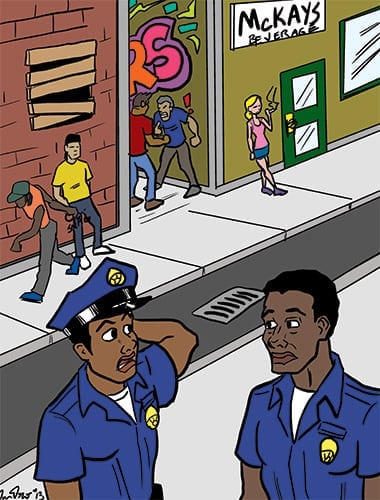
The Massachusetts Association of Minority Law Enforcement Officers (MAMLEO) has leveled unwarranted accusations against Boston’s Police Commissioner Edward Davis accusing him of racial discrimination. It is well known that municipal police are more effective when they have a trusting and cooperative relationship with the community. In urban areas around the country residents are harried by the continued violence of youth gangs. This is no time to pursue strategies that generate alienation between the people and the police.
Strangely enough, MAMLEO is intentionally causing such a conflict. Assertions that Davis is a bigot cause some minorities to view the police with hostility. This attitude is not helpful when people must rely on the police for protection.
Such assertions by the leadership of MAMLEO have no support in fact. The complaint stems primarily from the dismal promotion record of minorities, but MAMLEO knows that is the result of poor performance by minorities on the tests required by the state civil service.
The road to promotion is through a successful score on the sergeant’s exam. The only requirement to take the exam is at least three years of service on the police force. The racial classification of those who took the last sergeant’s exam was 277 whites, 165 blacks, 48 Hispanics and 13 Asians. A so-called passing score of 70 percent was attained by 117 blacks, but none finished in the top 10 percent. Only 41 whites and one Hispanic scored that high.
While it might be encouraging to the officer taking the test to learn that he or she has passed, promotions will be made from the top 10 percent as required by civil service rules. Also, no blacks have finished in the top 10 percent of the last exams for lieutenant or captain.
Rather than develop a solution to the problem, MAMLEO chose to insult the police commissioner for refusing to flout the civil service laws. And they even criticized Davis’ plan to have consultants design an exam that would be more relevant and more culturally compatible for blacks.
There is a simple solution which has been done effectively before. In 1965 there were so few black police officers in Boston that the Bay State Banner advertised in its pages for recruits and established a curriculum to train applicants to pass the test. It worked. One of the program’s first graduates was Billy Celester who went on to become the highest ranking police officer in Boston history.
In an editorial entitled “Preparation is key,” dated Nov. 22, 2012, the Banner suggested that MAMLEO assume responsibility for training its members to perform better on all the qualifying tests. There is no reason to believe that blacks lack the intellectual capacity to perform as well as other applicants, if not better. Higher pay of about $345 per week on the day shift should be enough to encourage patrolmen to study for the sergeant’s exam.
At any rate, it is an unconscionable disregard for the welfare of the black community for MAMLEO to instigate hostility of the community toward the police. The people and the police have to work together to establish a safe community.






